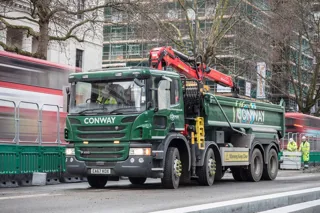The leaders of the UK’s major fleets are being urged to make a Clean Van Commitment following research that warned pollution from each diesel van in its lifetime could cost the NHS up to £25,000.
The organisation behind national Clean Air Day, Global Action Plan, is calling on the UK’s biggest fleets to lead by example when they sign up to a commitment to replace a proportion of their vans with models that are capable of zero emissions.
It argues that replacing diesel vans with zero-emission-capable vehicles, ideally pure battery-electric vans, could save lives and millions of pounds in NHS spending on health issues caused by vehicle emissions in urban areas.
Research from the University of Oxford and the University of Bath revealed that overall health damage from car and van emissions costs the NHS and society £6 billion per year, with nearly 90% thought to be a result of diesel emissions.
The UK’s 3.7 million vans are estimated to be responsible for £2.2bn of this cost.
Inner city areas are the worst affected, where a diesel van incurs health costs of £24,555 over a nine-year lifecycle.
Across the UK, the average is £5,107. By contrast, the lifetime cost for a battery-electric van would be £1,443, with the health costs relating to ancillary emissions, such as brake and tyre wear.
The total health cost per vehicle figure is also likely to be affected by the age of the van, mileage and driving style, but a shift to zero emissions reduces health costs in all cases.
Global Action Plan’s aim is to initially secure the backing of 100 of the biggest van fleets in the country, because they can make the most impact as they account for hundreds of thousands of commercial vehicles.
The signatories will be revealed at the Global Zero Emission Vehicle Summit being held on September 11/12 in Birmingham.
Roundtable discussions are already underway between Clean Van Commitment organisers, fleet leaders and their company chief executive officers.
Global Action Plan says it has already heard from 60% of the target fleets to say they are considering joining the group, representing a total fleet size of more than 100,000 vans.
It says a clear commitment will kick-start the green van market, as manufacturers will have clarity about expected demand and it will help energy suppliers to plan ahead.
Chris Large, partner at Global Action Plan, said: “We highlight this not to bash diesel, but to impress the need for urgent action.
“I believe there are some huge opportunities for those organisations that decide to lead on adopting clean technologies in their fleet.
“This is an open invitation for large fleet operators to join this Clean Van Commitment, to be part of the leading van fleet operators who are showing that we do want to solve this problem.”
He was speaking at an event organised by delivery giant UPS at its Camden depot, where it showcased progress towards converting its 200-strong delivery fleet to zero-emission vehicles by the end of 2019, with 80 EVs already operating from the logistics hub.
The delivery giant’s experience has provided valuable insight into key issues fleets need to consider when moving to large-scale EV adoption.
At the event, Shirley Rodrigues, London deputy mayor for Environment and Energy, said: “As part of our targets for a zero-carbon city by 2050, electrification of our fleet is absolutely critical.
“We need to clean up London’s dangerous air and we need to act now. Our partners and businesses have a role to play in improving air quality.”
London’s action on air quality has included the introduction of plug-in hybrid taxis and a commitment to all new buses being zero-emission or hybrid from this year.
She added that infrastructure updates were critical, with one in 10 electricity sub-stations nearing capacity, adding: “We need to make sure the infrastructure businesses require is there and we are looking at how smart technology and data can help.”
Bex Bolland, head of air quality for Global Action Plan, concluded: “We are prioritising where the health impact is the greatest and it is an opportunity for fleets to differentiate themselves. We want to get fleets representing each sector of industry to join up.”




















Login to comment
Comments
No comments have been made yet.